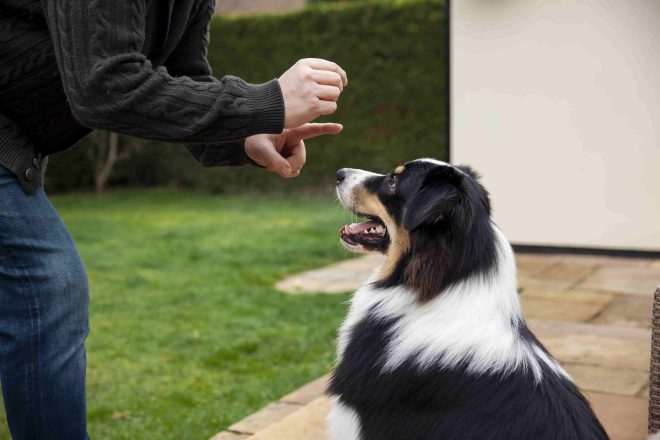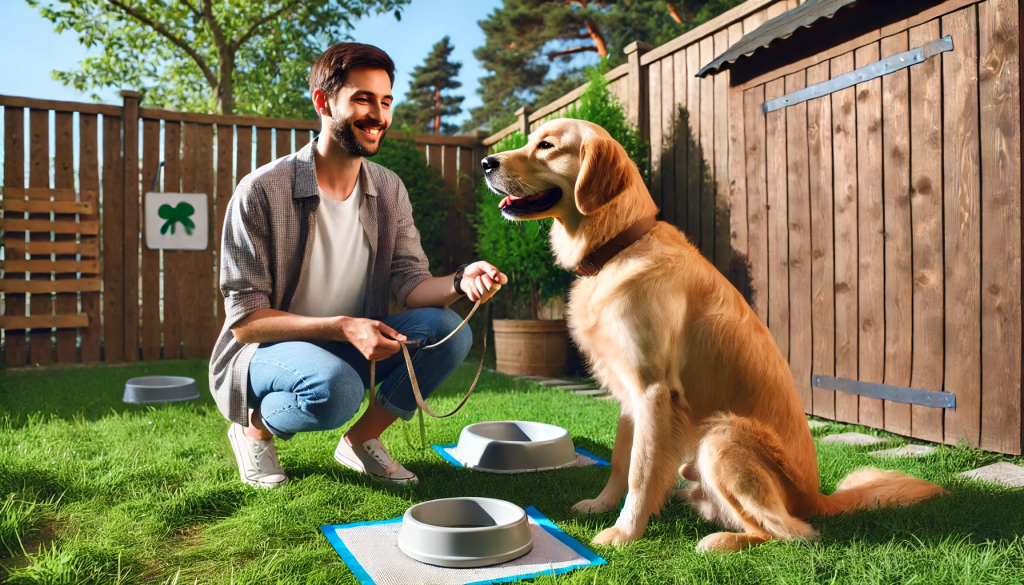
Training an adult dog can be very difficult, like using the bathroom out may seem though, but it is possible. The idea we have is only puppies can learn but older dogs can learn too and all you need is a little patience, structure, and consistency. Whether you adopted a rescue dog, moved to a new home, or your dog slipped back into bad habits, these six proven methods will help you house train your adult dog successfully. With my experience and what I have learnt, I will give you all six easy steps to train your adult dog at home in this blog post.
1. Establish a Consistent Routine
For all this to work out smoothly, know that dogs thrive on routine. Make sure you have a schedule time for your adult dog to go outside and this helps. Take your dog out:
- First thing in the morning
- After meals
- After playtime or naps
- Before bed
Always take them to the same spot when you them outside. The scent motivates them to go there again. You can even use a phrase like “go potty” so they associate the words with the action. As time goes on, your dog’s body will adjust to the rhythm, making bathroom breaks more predictable.
Doing the regularly will also prevent your dog from easing inside because it learns there are plenty of chances to relieve themselves outdoors.
2. Supervision and Confinement
Giving your dog too much freedom too soon is one of the biggest mistakes. Allowing your dog to roam in the house unmonitored, can cause accidents. I will advise you keep a close eye on them when indoors. Look for signs like sniffing, circling, whining, or heading toward the door. This usually means it is time to go outside.
When you are busy or can not supervise all the time, confinement is the key. Use a crate or a gated area to limit your dog from moving around. Dogs usually avoid messing where they sleep. Make sure the crate is spacious and comfortale so they don’t feel like they are being punished. When you realize your dog is building a reliable habits, then you can give it more freedom.
3. Positive Reinforcement and Rewards
House training your dog works with motivation. Whenever your dog goes out to potty, reward them with treats, playtime or praises. One thing you need to know is timing is everything make sure you reward them right after their good behavior so your dog connects the dots.
Saving something special also works wonders. Like giving them chicken bits or training treats combine that will an excited word like “Good job” and your dog will quickly learn that going outside brings positive results.
Do not punish them when accident happens. Criticizing or scolding them makes dogs anxious and when a dog is anxious they are more likely to make mistakes.Focus on rewarding the right behavior instead.
4. Recognize and Respond to Cues
One thing about every dog is that, they give signs when they need to go out so just need to learn what yours look. Some of these common signs include:
- Sniffing the floor
- Circling or pacing
- Barking or whining
- Going to the door
Every dog and it’s unique habits, some dogs will stare at you or pawing. When you see these signs, act fast. Take your dog outside immediately and reward them if they go.
You can also teach your dog to signal you. Some owners hang a bell by the door and train their dog to ring it when they need to go to the bathroom. This helps prevent accident and gives your dog confidence.
5. Clean Up Accidents the Right Way
As a dog owner, accidents are bound to happen and how you handle it is more important. Just wiping it is not enough because dogs have powerful noses, and they smell urine at a spot, they will likely return to it.
Enzyme based clearner can help break down odors at the source. Do not use ammonia based products because they have the same smell as urine and may attract your dog back.
As I said earlier accidents are bound to happen but when this happens, stay calm and do not punish your dog. What you need to do is clean well and focus on preventing the next accident from happening or more frequent potty breaks. Every accident is a learning opportunity for both of you.
6. Be Patient and Persistent
House training and adult dog does not happen overnight it takes sometime. In some cases, dogs may catch up in a few weeks, while others takes a couple of months. The most important thing is to stay consistent and be patient.
Look at it like you are teaching someone a new habit and they may slip up along the way but with constant teaching or training, the get to learn. It is also important to celebrate small wins, example: your dog going to the door or holding it longer than they usually do.
When progress feels slow, do not give up. Determination builds trust, and as time goes on, your dog will understand what is expected.

ALT TAG: An adult dog being house trained outdoors in a backyard.
Common Mistakes to Avoid
- Punishment: Do not rub your dog’s nose in their mess this only causes fear.
- Inconsistency: Skipping rewards or not sticking to a schedule confuses your dog.
- Too much freedom too soon: Gradually increase access to the house once habits are reliable.
- Improper cleaning: Lingering smells encourage repeat accidents.
When to Seek Professional Help
I know sometimes being consistent does not really do the job or you can be consistent and your dog still struggles. I will advise you get help from a professional trainer. These professional trainers can know the issues and help you with it.
You can also check with your vet for medical problems like urinal infections or incontinence can cause frequent accidents. Getting support from an expect does not mean failure but another step towards success.
Extra Tips for Success
Keep feeding schedules regular so potty times are easier to predict.
Limit water before bedtime if nighttime accidents are a problem.
Use verbal cues like “go potty” to create clear associations.
Always stay calm your dog will pick up on your energy.
Conclusion
House training adult dog takes a lot of patience, structure, and positive reinforcement, but it is absolutely possible. By setting a routine, supervising closely, rewarding the right behavior, cleaning properly, and staying persistent, you’ll guide your dog toward success.
Always remember, this is not juts about preventing accidents it is about building trust and communication with your dog. Take this from someone who has been doing this for years now. With time and consistency, you will enjoy a cleaner home and a happier, and a more confident pet.
Frequently Asked Questions
1. Can older dogs really be house trained?
Yes, dogs of any age can learn. It may take more time than with puppies, but it’s absolutely possible.
2. How long does house training an adult dog take?
It depends on the dog. Some learn in weeks, others in months. Consistency is the biggest factor.
3. Should I use puppy pads with an adult dog?
They can help in certain cases (like apartments), but they may confuse dogs if your goal is outdoor training.
4. What if my dog regresses after learning?
Go back to basics: routine, supervision, and rewards. Stress or changes in routine can trigger setbacks.
5. Is crate training okay for adult dogs?
Yes. Crates provide structure and comfort when used properly they’re not cruel.
RELATED POST: Dog Food and Feeding Schedules: Complete Guide for Healthy Dogs
GIPHY App Key not set. Please check settings